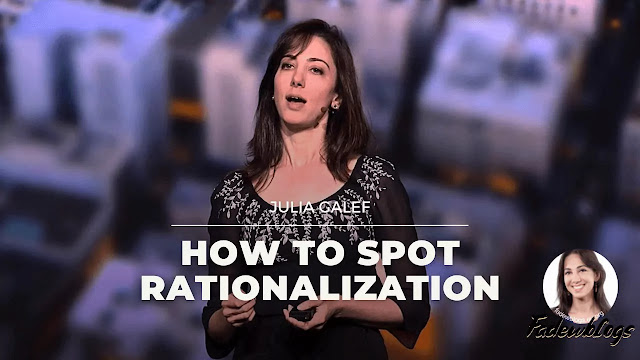Because to rationalize means to come up with a seemingly logical or rational explanation for what's really an irrational belief or behavior.
So, if you can learn to notice your rationalizations, then you can spot irrationalities in the way you're thinking or behaving, and rectify them.
So we tell ourselves stories all the time about why we believe a certain thing, why we did a certain thing, what's going to make us happy, or what our strengths and weaknesses are.
And often those stories are true, but sometimes they're just excuses or rationalizations. Sometimes rationalizations are plainly ridiculous, and if you were paying attention, if you really wanted to notice you would see that they were clearly false.
So in this instance, I might tell myself "Well I really have to eat this huge plate of whatever it is that I just cooked because, well, I have to test the recipe right?
I mean I have to see whether it worked or not, and what I have to change the next time I cook this dish."
Which is a fine reason for eating a small portion. It doesn't make any sense as a reason for eating a large portion.
I've also rationalized to myself that I really need to polish off this entire box of cookies on the grounds that if I eat them all, then they won't be there to tempt me.
How Do You Spot A Rationalization?
Counter the reason
The template that I find the most useful is if this reason were true, then what else would have to also be true?
I'll give you an example: A friend of mine had a conversation with a guy recently in which he said that he can't respect a girl if she goes home with him on the first date.
My friend asked him why, and he said, "Well, I mean it's so risky. Didn't her parents ever teach her not to do something as stupid as going home with a guy she barely knows?"
I wasn't there, obviously, but if I had been, I would have asked him, "Okay, so you say the reason that you don't respect girls who hook up with you on the first date is that it's a risky thing for them to do.
So let's say a friend of yours went out for a walk at night in a dangerous part of town all by himself. That's risky. Would you then lose respect for your friend?"
And obviously, I didn't ask him this because I wasn't there, but I strongly suspect the answer is no, you wouldn't lose respect for a friend who did that.
You might say, "Dude that was stupid, you shouldn't do that."
But what this points to is the fact that his original reason that he gave for disrespecting girls who hook up with him early on was just a rationalization, and there's actually a probability of that a lot of other things going on there about purity, attitudes, about traditional sexual morals and such.
Experiment with thoughts
Another thing you can do to spot rationalization is a thought experiment.
So let's say you're at a party, and there's some attractive stranger and you're thinking of going up to talk to them, maybe ask them out.
But you're nervous and afraid of rejection, so you tell yourself, "Well, I don't even have time for dating now anyway, I really just want to focus on my schoolwork right now."
This might be true, but it should wave a red flag that this reason that you're giving for yourself, conveniently gets you out of doing something that was scary to you.
So that doesn't necessarily mean it's false, but it means you should probably scrutinize that reason a little more closely to see if it's real.
And the thought experiment you can do is to ask yourself, "Well, let's say I knew that girl was interested in me, and that if I went over there to ask her out she'd say yes."
Definitely then would I say, "Well I don't really feel like doing it anyway because I just want to focus on my schoolwork?"
And if the answer is "no", in that case, you would definitely go ask her out.
Well, then that means that your original reason was a rationalization.
However, you still might decide that it's not worth the risk to go over and ask her out, but until you acknowledge to yourself that your original reason was fake, you're not even going to guess the point where you're doing that cost-benefit analysis to decide whether it's worth it to go ask her out.
 |
| Julia Galef, co-founder: Center for Applied Rationality |


